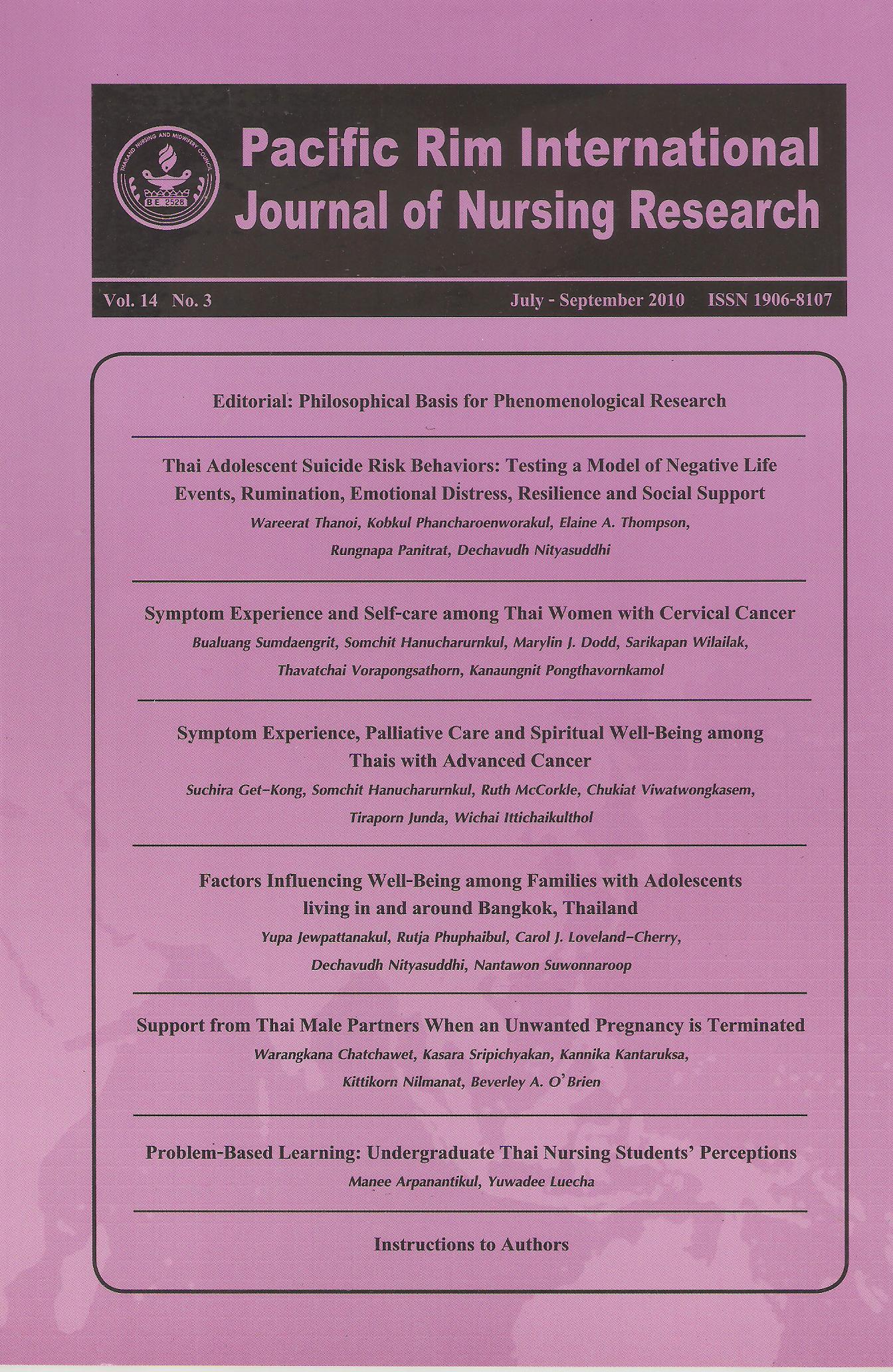Symptom Experience and Self-care among Thai Women with Cervical Cancer
Keywords:
มะเร็งปากมดลูก, ประสบการณ์ของอาการ, การดูแลตนเอง, สตรีไทย, Cervical cancer, Symptom experience, Self-care, Thai womenAbstract
บทคัดย่อ
การศึกษานี้มีวัตถุประสงค์เพื่อสำรวจ (1) อาการที่เกิด ความรุนแรงและการรบกวนของอาการในสตรีไทยที่เป็นมะเร็งปากมดลูกรายใหม่ ตั้งแต่ก่อน ระหว่างและภายหลังการรักษา 1 เดือน (2) วิธีและประสิทธิภาพของการดูแลตนเองที่สตรีใช้ในการลดอาการที่เกิดบ่อย มีความรุนแรงและมีการรบกวนการดำเนินชีวิตที่สตรีเลือกจำนวน 5 อาการ และ (3) รูปแบบการเปลี่ยนแปลงของอาการและประสิทธิภาพในการดูแลตนเองตั้งแต่ก่อนจนถึงภายหลังการรักษาในสตรีจำนวน 190 คนที่มีคุณสมบัติตามเกณฑ์ที่กำหนดและเข้ารับการรักษาในโรงพยาบาลสังกัดมหาวิทยาลัย 1 แห่ง กระทรวงกลาโหม 2 แห่งและสถาบันมะเร็งแห่งชาติ 1 แห่ง เครื่องมือที่ใช้ในการวิจัยมี 3 ชนิดได้แก่ แบบบันทึกข้อมูลส่วนบุคคล โรคและการรักษาแบบประเมินอาการจากโรคและการรักษาและแบบสอบถามพฤติกรรมการดูแลตนเอง เก็บข้อมูล 3 ครั้ง ตั้งแต่ก่อน ระหว่างและภายหลังรับการรักษาครบ 1 เดือน
ผลการศึกษาพบว่า การเกิดอาการและวิธีการดูแลตนเองมีความแตกต่างกันในแต่ละช่วงของการรักษา การมีสารคัดหลั่งจากช่องคลอดเป็นอาการที่พบมากที่สุดในระยะก่อนการรักษา แต่อาการกลืนไม่ลงเป็นอาการที่มีความรุนแรงและรบกวนการดำเนินชีวิตมากที่สุด การมีอารมณ์เปลี่ยนแปลงเป็นอาการที่ผู้ป่วยต้องจัดการมากที่สุดทั้งระยะก่อนและหลังการรักษา การคิดว่าไม่ว่าเหตุการณ์อะไรจะเกิดก็ต้องเกิด และการผ่อนคลาย เป็นการดูแลที่ผู้ป่วยใช้มากที่สุด ในขณะที่การใช้ธรรมะเพื่อจัดการการเปลี่ยนแปลงทางอารมณ์เป็นวิธีที่มีประสิทธิภาพมากที่สุดทั้งในระยะก่อนและหลังการรักษา นอกจากนี้การทำความสะอาดบริเวณอวัยวะสืบพันธุ์ภายนอก เป็นวิธีที่ผู้ป่วยใช้มากที่สุดเมื่อมีสิ่งคัดหลั่งทางช่องคลอด อ่อนเพลียเป็นอาการที่พบมากที่สุดขณะรักษา ส่วนอาการท้องเสียและการติดเชื้อบริเวณทวารหนักเป็นอาการที่มีความรุนแรงและรบกวนการดำเนินชีวิตมากที่สุด การงีบหลับเป็นวิธีการดูแลตนเองที่ใช้มากและมีประสิทธิภาพมากที่สุดในการลดอาการอ่อนเพลียทั้งในระหว่างและหลังการรักษา การเปลี่ยนแปลงของผิวหนังเป็นอาการที่พบมากที่สุด ในระยะ 1เดือนภายหลังการรักษา ความลำบากในการมีเพศสัมพันธ์เป็นอาการที่มีความรุนแรงมากที่สุด ในขณะที่ความวิตกกังวลเป็นอาการที่รบกวนการดำเนินชีวิตมากที่สุด อย่างไรก็ตาม การนอนหลับยากเป็นอาการที่ต้องจัดการทั้งสามระยะของการรักษา การนอนพักบนเตียงเป็นวิธีการดูแลตนเองที่ใช้มาก และวิธีที่มีประสิทธิภาพมากที่สุด ได้แก่ การรับประทานยานอนหลับ การเปลี่ยนแปลงของอาการเพิ่มขึ้นในระหว่างการรักษาและลดลงภายหลังการรักษา ส่วนประสิทธิภาพของการดูแลตนเองมีการเปลี่ยนแปลงลดลงระหว่างการรักษาและเพิ่มขึ้นภายหลังการรักษาอย่างมีนัยสำคัญทางสถิติ ผลการศึกษาครั้งนี้จะช่วยให้บุคลากรในทีมสุขภาพสามารถช่วยเหลือและส่งเสริมให้ผู้ป่วยได้รับการดูแลให้เหมาะสมกับอาการที่เกิดขึ้นในแต่ละช่วงเวลาของการรักษา
คำสำคัญ: มะเร็งปากมดลูก; ประสบการณ์ของอาการ; การดูแลตนเอง; สตรีไทย
Abstract
The purposes of this study were to describe the: (a) occurrences, intensity and distress of Thaiwomen’s symptoms pre-treatment (T1), during-treatment (T2) and one month post-treatment (T3) for cervicalcancer; (b) strategies and effectiveness of self-care behaviors used to relieve the five most frequent, severeand distressing reported symptoms during each period of treatment; and, (c) patterns of change in symptoms thewomen experienced and their self-care effectiveness from pre- to post-treatment (T1 – T3). One hundred and ninetysubjects, recruited from four hospitals, completed three questionnaires, including the: Demographic, Disease andTreatment Questionnaire; Modified Memorial Symptom Assessment Scale; and, Modified Self-Care Diary.
Different symptoms and self-care behaviors occurred during each treatment period. Duringpre-treatment, vaginal discharge was the most common symptom, while difficulty swallowing was the mostintense and distressful symptom. However, during both pre- and post-treatment, mood changes wasthe symptom that most often required self-care, while “tried to think that whatever will be, will be anddo the best you can” and “relaxed by walking, watching TV or listening to music” were the most frequentlyselected forms of treatment, and “used Dhamma to calm down” was the most effective treatment. The mostcommon self-care performed for vaginal discharge was “frequently cleaned the perineum.” During treatment,fatigue was the most frequently occurring symptom, while diarrhea and rectal irritation were the mostintense and distressful ones. “Took naps” was the most frequently used and effective strategy for relievingfatigue. After treatment, changes in the skin was the most common symptom, while a problemwith sexual interest/activity was the most intense symptom and feeling nervousness was the mostdistressful symptom. Sleeping difficulty was found to be present during all three treatment periods;with “rested in bed” the most frequently used and “took sleeping pills” the most effective self-carestrategies. Changes in symptom experience increased significantly during treatment and decreasedduring post-treatment, while self-care effectiveness decreased during treatment and increased duringpost-treatment. The findings suggest health care providers need to assist women in learning toutilize appropriate self-care strategies in accord with their symptom experiences.
KeyWords: Cervical cancer; Symptom experience; Self-care; Thai women
Downloads
How to Cite
Issue
Section
License
Copyright: The Pacific Rim International Journal of Nursing Research, Thailand Nursing & Midwifery Council has exclusive rights to publish, reproduce and distribute the manuscript and all contents therein.








.png)



